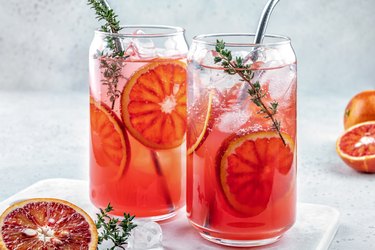
Fruit punch is a surefire crowd pleaser. Whether you're hosting a backyard BBQ on a hot day, a birthday party with guests of all ages or even a casual family lunch, nothing brightens up the table like a fresh, colorful bowl or pitcher of punch. But what does it take to whip up some punch that's as tasty as it is vibrant? If you're uncertain (or just looking to up your juice game), here's a splash of just the inspiration you need.
Part 1: Punch 101
Video of the Day
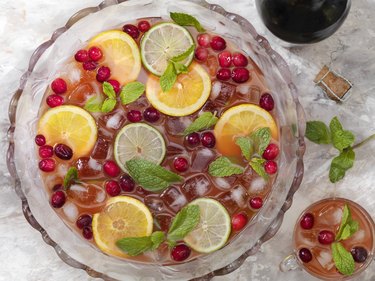
Ready to get creative with your fruit punch? The first thing to consider is the ratio of fruit juice to fizz. You have plenty of leeway with proportions, but a good rule of thumb is to have a 2-1 ratio of juice to soda. Punch bowls typically hold at least a gallon, so as long as you know the size of your punch bowl, the math is pretty easy. A gallon is 128 ounces, so you'll need approximately 80 ounces of fruit juice to 40 ounces of bubbly stuff. This leaves space for garnishes, fruit, ice or other extras.
Video of the Day
Then there's the question of which juices should be combined. Everybody's taste is different, but some things always work well in conjunction. You usually can't go wrong mixing tropical flavors together, for example—so if you need 10 cups of fruit juice for a gallon of punch, you might break that down as 5 cups orange juice, 3 cups pineapple juice and 2 cups mango, passionfruit or other tropical fruit.
We're also a fan of these thematic combos:
- Refreshing Blends: Light-tasting juices such as watermelon and strawberry create a fresh and springlike flavor profile. You can make your own watermelon juice by pulverizing diced watermelon in a blender.
- Jewel Tone-Juices: Clear choices like apple, cranberry and pomegranate juice combine to make a pretty, jewel-like punch.
- Seasonal Mixes: Selecting for seasonality (think: summer stone fruit and berries, autumnal apples and pears, holiday-season oranges and cranberries) is a fun option, especially if you live in an area where they're grown. That way you can use fresh fruit to complement juices.
- Color Combos: Selecting for color is another fun option, especially for a gathering where you'll have multiple punch bowls (or pitchers) set out. Reds, yellows and oranges are easy because many fruit juices fall into that part of the spectrum, but you can also go for deep purple (grape, blueberry, blackberry), nearly colorless (apple juice and white grape juice with a colorless soda for the fizzy component), pink (pink lemonade, watermelon) or even green (limeade and kiwi). Yum!
Now let's move on to some tips and tricks for creating the perfect fruit punch!
Part 2: Punch Tips & Tricks
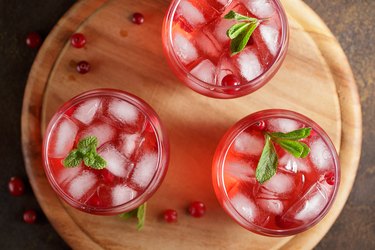
1. Begin with basics
One of the main ingredients in any fruit punch is, unsurprisingly, fruit juice! You can mix fruit juices in any combination you wish, but you'll usually want to choose a combo that provides a solid base flavor (classic choices include pineapple juice, orange juice, cranberry cocktail or apple juice), then add others that complement it in flavor or color.
2. Get fizzy with it
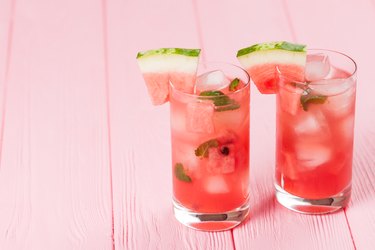
Part of what makes a party punch different from canned and powdered store-bought punches is carbonation. There are several ways to add sparkle to your punch. You could opt for a bottle of soda like ginger ale, Sprite or 7Up. For a more subtle dash of sweetness, try plain or flavored soda water.
Tip
For an adults-only punch, add fizz with a bottle of inexpensive bubbly. Prosecco, Spanish cava and domestic sparklers are fantastic, delicious choices.
3. Chill out
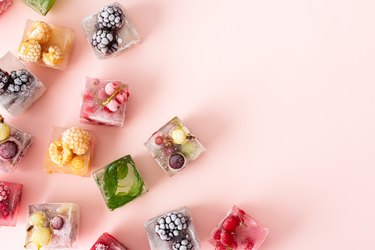
Your punch bowl (or pitcher, if that's how you roll) will be sitting out at room temperature for at least a couple hours. Ice cubes themselves will dilute punch over time, but frozen cubes of fruit juice offer an inventive alternative for keeping your batch cool. Feeling extra fancy? Make a floating centerpiece by freezing berries and cut-up fruit (or even herbs) in a ring mold, then unmolding the ring to serve as a floating, functional garnish.
Fruit Drinks Vs. Real Fruit Juice
There’s an important distinction between actual fruit juice and the kind of fruit drinks that are “made with real fruit juice!” That phrase doesn’t mean it is fruit juice, just that there’s a bit of fruit juice in there somewhere. In practice, if you read the label, the juice component is often listed after ingredients such as sugar, artificial colors and artificial flavors. By the time you’ve added soda or sherbet to the bowl, you’ll find yourself with an absolute sugar bomb on your hands rather than a simple, refreshing punch.
Note that cranberry cocktail and lemonade are special cases, as unadulterated cranberry juice and lemon juice (or lime juice, for that matter) are really tart. If you’re using sweetened versions of those juices, be aware of their sugar content and balance it out with unsweetened juice. It works the other way too. If you taste your punch and find it sweeter than you’d like, balance it out with the refreshing acidity of unsweetened lime, lemon or cranberry juice.
4. Don't forget fresh fruit
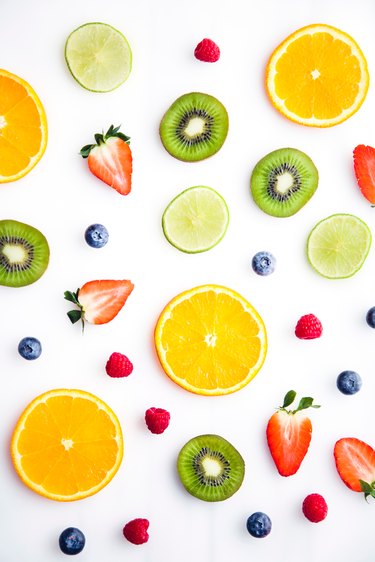
Another ingredient that's oddly easy to overlook in fruit punch is, well, fruit! Frozen or fresh fruit are equally great options, but you should use either generously. Opt for things large enough to avoid with your ladle (such as orange slices) or small enough to fit into your ladle (like berries and grapes). For larger fruit and berries, you'll need to halve or dice them to create a more practical size. This calls for a bit more prep time, but the added visual appeal is worth it—especially at celebratory occasions such as birthday parties or long holiday weekends. Besides, a fruit punch should be fruity!
5. Reconstitute concentrate
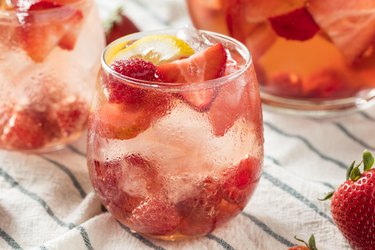
Many juices are available as frozen concentrates. Reconstituting them with plain club soda gives you the opportunity to create a custom-flavored "soda" for your punch. Also, if your punch has been diluted by too much ice, adding a few scoops of lemonade concentrate or orange juice concentrate will help restore it.
6. Spruce it up with sherbet
Our next tip is perfect for dessert lovers: Toss in a few scoops of sherbet! A sherbet punch boasts a layer of surface foam that gives cups of punch an elegant appearance and—because sherbet itself usually contains dairy—a dash of calcium. Because it adds dairy, though, you might want to set out a dairy-free second punch for any guests who are vegan, lactose-intolerant or otherwise unable to enjoy dairy products.
7. Make it a mocktail
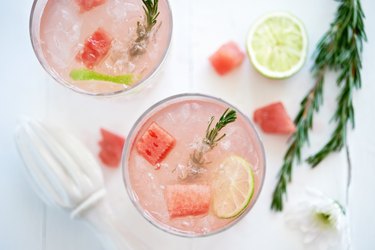
Nonalcoholic punches are usually described as kid-friendly, but that doesn't mean they can't be tweaked to suit adult tastes. Using brewed tea or green tea as part of your base gives the punch some tannins and astringency (much like wine), while a splash of bitters and fresh herbs such as mint, basil or tarragon can take you squarely into mocktail territory. If you really want to go all in, select from the growing number of nonalcoholic wines and spirits in order to replicate your favorite summer drinks in a nonalcoholic fashion.
8. Choose the perfect vessel
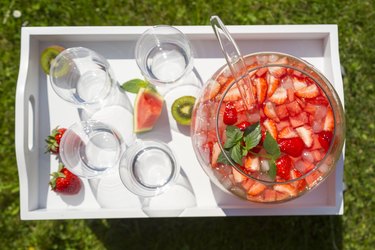
Punch bowls are the traditional vehicle for serving punch, of course. But depending on the occasion, you might prefer to use a large pitcher. These are especially convenient for smaller batches, but you can divide up a large party punch recipe between multiple pitchers and distribute them around the room. This can help avoid traffic jams around the punch bowl, especially if it shares a table with finger foods.
Now that you've gotten a crash course in all things fruit juice and add-ins, it's time to start designing your dreamiest drink recipe! Whether you keep it simple, go overboard with fresh fruit, whip up a delicious mocktail pitcher or embrace the bubbles, you'll certainly be packing a punch at your next gathering.